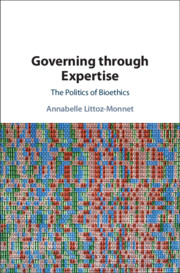Book contents
- Governing through Expertise
- Governing through Expertise
- Copyright page
- Contents
- Acknowledgements
- Abbreviations
- 1 Introduction: Governing Science and Technology
- 2 Re-conceptualising the Enmeshment of Knowledge and Politics
- 3 The Fabric of Ethics Experts
- 4 Researching Embryonic Stem Cells
- 5 Manipulating Particles on a Small Scale
- 6 Tracking People’s Behaviour
- 7 Conclusion
- Annex European Group of Ethics Experts 1991–2020
- Bibliography
- Index
4 - Researching Embryonic Stem Cells
Bypassing Conflict
Published online by Cambridge University Press: 30 October 2020
- Governing through Expertise
- Governing through Expertise
- Copyright page
- Contents
- Acknowledgements
- Abbreviations
- 1 Introduction: Governing Science and Technology
- 2 Re-conceptualising the Enmeshment of Knowledge and Politics
- 3 The Fabric of Ethics Experts
- 4 Researching Embryonic Stem Cells
- 5 Manipulating Particles on a Small Scale
- 6 Tracking People’s Behaviour
- 7 Conclusion
- Annex European Group of Ethics Experts 1991–2020
- Bibliography
- Index
Summary
Chapter 4 examines the case of the EU controversy on the funding of embryo research,arguing that the mobilisation of ethics experts allowed policymakers to successfully bypass the conflict which had surfaced in the field. The mobilisation of the EGE facilitated the technicalisation of discussions on embryo research, by shifting the debate away from ‘either-or’ positions and presenting a range of intermediary scenarios. The EGE acted as a locus for the elaboration of a workable policy solution, in a context in which no agreement could be reached in the political arena. The position of ethics experts could then be invoked by policymakers in order to back their own position. The European Commission was able to mobilise expert bioethicists to such avail because policymakers and experts worked together in various crossing points and developed a similar approach to the issue. Experts also calibrated the knowledge they produced, in order to make policy possible. When the debate reopened ahead of the adoption of FP7, EU policymakers carefully orchestrated theknowledge production process by strictly delineatingthe question experts were asked.
Keywords
- Type
- Chapter
- Information
- Governing through ExpertiseThe Politics of Bioethics, pp. 64 - 81Publisher: Cambridge University PressPrint publication year: 2020

